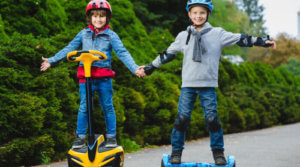When your child starts school, the question of how to spend his or her free time soon comes up. Hobbies allow your child to try out interests and develop talents for which there is no room at school. Above all, it is important that your child enjoys his or her leisure activities. Then a hobby contributes significantly to the formation of your child’s personality. There’s a lot of choice, so how do parents know what’s the right hobby for their child?
Table of contents
Children And Hobbies
Hobbies are a great way to spend free time doing meaningful activities that contribute to your child’s positive development. In addition, when playing sports, making music or other activities, children expand their social skills and improve both their motor and cognitive abilities.
Parents, of course, are always eager to support their child in the best possible way, preferably in all areas. Unfortunately, some overdo it in this respect and the children rush from one appointment to the next, even in kindergarten. In this way, leisure activities become stressful and overwhelming for the children, which is not the actual purpose of a fun activity.
That’s why children should have no more than two hobbies, so that in addition to homework, there is still enough unscheduled time that the children can organize themselves and simply play.
Free play is part of a child’s needs and is very important for the healthy development of your child, because this is also where children train important skills that they will need in life, such as social skills, self-confidence and creativity.
- Also interesting:
- The best Germany jerseys for kids
- Recommended diabolo sets
- Recommendable children’s bicycles 18 inch
Exercise Is Good For You: Sports Activities For Kids
Children who like to let off steam and enjoy exercise can also combine this with a hobby. Here, your child can improve his motor skills and develop a better feeling for his body.
This builds self-esteem and confidence in their physical abilities: your child knows what they can do physically, which gives them more confidence and the self-esteem they need to keep rising to new challenges – not just in sports, but in life in general. In addition, your child is also doing something for his or her physical fitness and health. Sports also help relieve stress that can arise in children due to the pressure to perform at school. Regular exercise makes your child more relaxed and better able to cope with the challenges of everyday life.
Team Player Or Lone Fighter?
If your child is outgoing and a team player, team sports such as soccer, handball or basketball, but also gymnastics and dancing are suitable. The point here is to be able to fit into a group and contribute to winning a game or a successful dance performance with your own skills.
If your child is more of a reserved, disciplined child, perhaps a sport where he or she does not have to interact with others is better. These include ballet, rock climbing, horseback riding or swimming, as well as tennis or martial arts.
To practice a particular sport, you always need the appropriate: sports clothes, ballet shoes, climbing helmet, riding boots and whatever else needs to be purchased. Before you decide on a particular sport for your child, you should find out about the costs involved and whether the equipment can be borrowed for testing purposes.

Singing Or Playing An Instrument: Music Promotes Many Skills
Many children enjoy music. Whether singing or playing an instrument – the possibilities are many in each case and even at elementary school age your child can develop his musical skills.
Making music also promotes your child’s development in many other ways: it improves and stimulates ear training, character development, creativity and a sense of rhythm. Playing an instrument also trains the child’s motor skills.
Especially if your child later plays in an orchestra, social skills such as the ability to work in a team and emotional intelligence are also promoted, because he or she has to get involved with others and fit into the community.
Learning A Musical Instrument
There are many different musical instruments that children can learn to play. However, while some instruments are suitable for elementary school children, others are more appropriate for older children. Glockenspiel, recorder and rhythm instruments are easy to learn and therefore also interesting for small and elementary school children, because they can quickly produce sounds with them.
Instruments such as the tuba, clarinet, flute or violin require a sufficiently large lung volume or good fine motor skills, which are developed enough from around the age of eight for the child to learn such a complex instrument.
However, before starting proper instrumental lessons, it is a good idea to enroll the child in early musical education. Here, the child learns the first simple instruments and the meaning of notes in a playful way.
Singing In The Choir
If your child sings in a choir, this also brings him certain advantages, because here, too, the child learns to fit into a community and to contribute his talent to a large team.
It also builds their self-confidence and develops not only fun in music, but also in learning: In the choir, new song lyrics and melodies are practiced again and again, which the children have to memorize (usually by heart). This is also a skill that is in demand at school and is very beneficial up to graduation and beyond.
Finding The Right Hobby
The range of recreational activities for kids is vast. How do you find something suitable for your child that he or she will enjoy in the long term? A first step in the search for the right hobby is to ask your child specifically about his or her interests and find out which hobby is suitable and which is not.

In general, you should always consider your child’s wishes when choosing a hobby. This is the only way to ensure that he or she has fun and develops a healthy ambition to constantly improve.
In sports, you have to train regularly, later also outside the actual training times in the club, in order to improve your skills. And in music, too, you won’t get better at playing or singing without regular rehearsal and practice. That’s a point you should definitely educate your child about before you make a decision.
After all, children can’t yet estimate the additional effort that can go into a hobby. If you’re not sure what your child will be facing, you should find out in advance about the clubs that might be suitable.
Local Offers And Trial Lessons
When looking for a suitable hobby, the next step is to suggest various options to your child that are available locally or in the immediate vicinity. Perhaps your child will show interest in a hobby that he or she did not know about before.
But to find out for sure whether the hobby you have chosen is really suitable, you should take up the offer of a trial lesson with your child. Then you can both see whether the hobby meets their expectations. The time factor also plays a role. Taking the child to and picking him up from school, taking him to gigs or games – that’s not always compatible with some jobs or other commitments.
Basically, the decision also depends on the character of the child. A reticent child is less likely to feel comfortable with a hobby that puts him or her first. If it is suitable, your child can also practice his new hobby together with a friend. This way, he or she is not alone new to the group and cultivates friendship.










